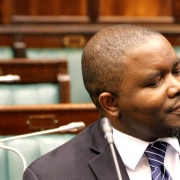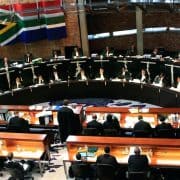|
Getting your Trinity Audio player ready...
|
Claims that she will no longer focus on high-profile cases are simply not true, said Public Protector Busi Mkhwebane at her first media briefing today.
“One of my priorities is to bring the services of our office to grassroots level. I want to make it possible for an African child in a small village to enjoy the fruits of our democracy. Some have misconstrued this goal to mean that I will turn a blind eye to high-profile cases.”
There is no merit in such claims, Mkhwebane said. “If there is improper conduct, we have the powers and are mandated to investigate not only in service delivery issues but also in abuse of power and state resources and breaches of the executive ethics code.”
The Public Protector’s mandate is not limited to investigations, but must be accessible to all persons and communities. People in far-flung areas must be able to access the office, and the team will achieve this through public awareness programmes as well as the establishing of memoranda of understanding with the Department of Justice for the use of magistrates courts.
Another of her focus areas is to meet with labour unions to settle staff grievances, and boost morale. “It’s hard to get the best out of the team when these issues are there.”
Mkhwebane has already made some decisions on the way forward. There will be no more use of donor funds because of the risks that they might attach uncomfortable conditions. Rather, “we will make sure that Parliament and government provide enough resources for us,” alluding to the lengthy battle for funding that her predecessor Thuli Madonsela had to deal with.
She will also do away with giving witty titles to investigations because they antagonise some people, and will aim to cut down on – even do away with – the use of consultants. Her aim is to rather build internal capacity in fields such as forensics and investigating, or use other government agencies. She has declared a moratorium on international travel, saying there has been enough note-sharing with overseas colleagues for the moment.
She also plans to do away with the backlog of old cases through a dedicated task team. This, and the focus on making the Public Protector more accessible at grassroots level, has led some to say that high-profile cases will be swept under the carpet.
Mkhwebane has not yet received a written handover document from Madonsela because of the latter’s busy last week in office, but she has received an e-mailed report and they have made plans to meet at a convenient time to discuss it.
“My appointment could not have come at a more opportune moment,” Mkhwebane said. “This is the time when most institutions will be engaging in forward-looking conversations, and we will be no different. I will have the opportunity to have strategic discussions and we will be able to put together a clear vision for the way forward.”
On the matter of the state capture report, which has been completed and awaits a date of release, she was close-mouthed, saying the matter is before the court and she may not do anything until the matter is heard on 1 November.
“If the court says publish the report we will go ahead and publish, if it says deal with it differently, we will do so.”
Asked whether she would oppose or support the motion to prevent the release of the report, she replied that she is still taking legal advice. Meanwhile the report is under lock and key to ensure it is not compromised.








